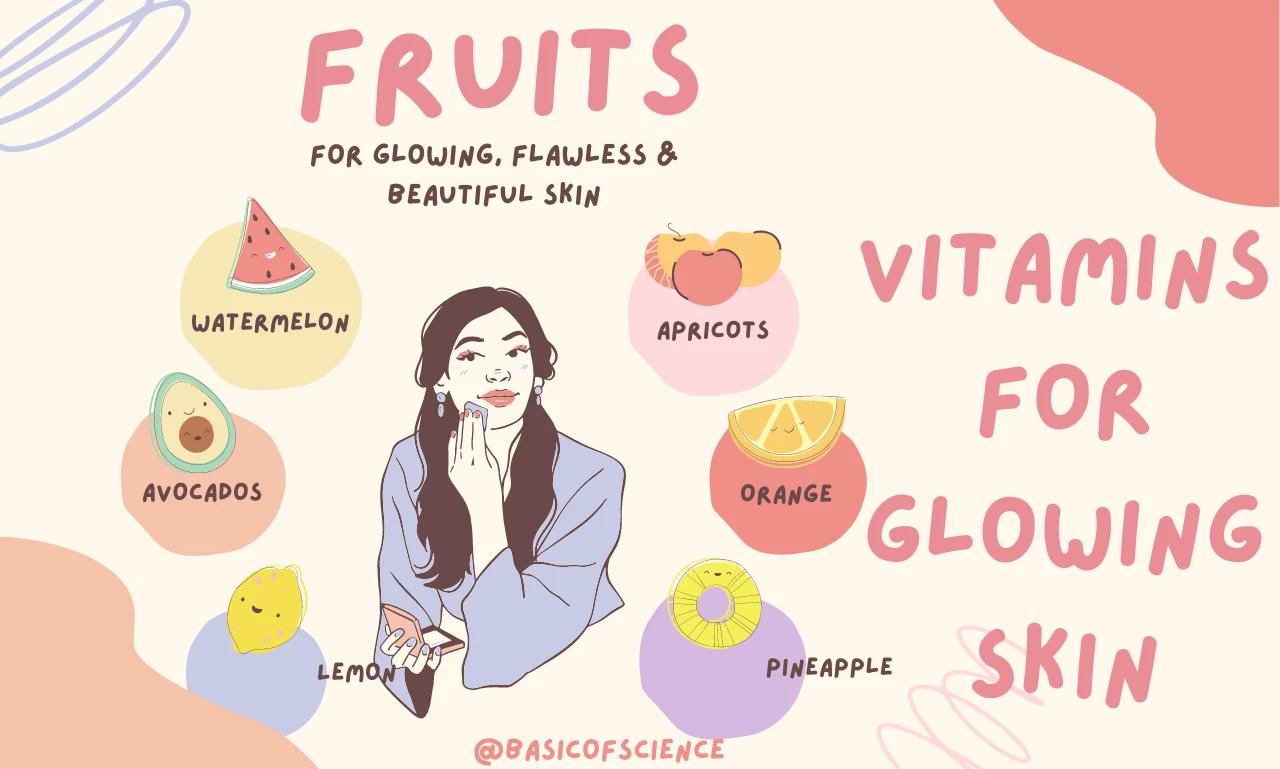Achieving glowing, radiant skin is a common beauty goal, and one of the most effective ways to reach it is through proper nutrition. Vitamins play a crucial role in maintaining skin health, each offering unique benefits that contribute to a vibrant complexion. In this blog, we’ll explore six essential vitamins for glowing skin, why you need them, and the best food sources to incorporate into your diet.

1. Vitamin A
Why You Need It:
Vitamin A is essential for skin repair and maintenance. It promotes cell turnover, which helps to keep your skin smooth and rejuvenated. This vitamin also has antioxidant properties that protect the skin from damage caused by free radicals.
Benefits:
- Reduces Wrinkles: Enhances collagen production, minimizing fine lines and wrinkles.
- Clears Acne: Regulates oil production, preventing acne breakouts.
- Evens Skin Tone: Promotes cell turnover, reducing the appearance of pigmentation and dark spots.
Food Sources:
- Carrots: Rich in beta-carotene, which the body converts into vitamin A.
- Sweet Potatoes: Another excellent source of beta-carotene.
- Spinach and Kale: Leafy greens packed with beta-carotene and other nutrients.
- Liver: High in preformed vitamin A, making it a potent source.
Incorporating these foods into your diet can help maintain and enhance your skin’s health and appearance.
2. Vitamin C
Why You Need It:
Vitamin C is a powerful antioxidant that plays a vital role in collagen synthesis, which is crucial for maintaining skin elasticity and firmness. It also helps in repairing damaged skin cells and brightening the complexion.
Benefits:
- Boosts Collagen Production: Helps maintain skin structure and elasticity.
- Fights Free Radicals: Protects the skin from oxidative stress and environmental damage.
- Brightens Skin: Reduces pigmentation and evens out skin tone.
Food Sources:
- Citrus Fruits: Oranges, lemons, and grapefruits are excellent sources.
- Bell Peppers: Particularly red bell peppers, which have a high vitamin C content.
- Strawberries: Packed with vitamin C and other antioxidants.
- Kiwi: Another fruit rich in vitamin C.
Consuming these vitamin C-rich foods can help promote a brighter, more youthful complexion.
3. Vitamin E
Why You Need It:
Vitamin E is known for its skin-protective properties. It acts as an antioxidant, helping to neutralize free radicals and protect the skin from damage. Vitamin E also has moisturizing properties that keep the skin hydrated and supple.
Benefits:
- Moisturizes Skin: Enhances skin hydration, preventing dryness and flakiness.
- Reduces UV Damage: Protects the skin from harmful UV rays and environmental pollutants.
- Heals Skin: Aids in the healing process of damaged skin.
Food Sources:
- Almonds: A great source of vitamin E and healthy fats.
- Sunflower Seeds: High in vitamin E and other nutrients.
- Avocados: Rich in vitamin E and healthy fats.
- Spinach: Also provides a good amount of vitamin E along with other vitamins.
Including vitamin E-rich foods in your diet can help maintain hydrated and protected skin.
4. Vitamin D
Why You Need It:
Vitamin D is crucial for skin cell growth and repair. It plays a role in maintaining the skin barrier and immune function, which helps in protecting the skin from infections and environmental damage.
Benefits:
- Promotes Skin Repair: Aids in the growth and repair of skin cells.
- Reduces Inflammation: Helps in reducing skin inflammation and irritation.
- Fights Infections: Supports the skin’s immune defenses against infections.
Food Sources:
- Fatty Fish: Salmon, mackerel, and sardines are rich in vitamin D.
- Egg Yolks: Contain a moderate amount of vitamin D.
- Fortified Foods: Many dairy and plant-based milk products are fortified with vitamin D.
- Mushrooms: Especially those exposed to sunlight.
Ensuring adequate vitamin D intake can support overall skin health and function.
5. Vitamin K
Why You Need It:
Vitamin K plays a significant role in blood clotting and wound healing. It helps in reducing dark circles under the eyes and minimizing the appearance of scars and stretch marks.
Benefits:
- Reduces Dark Circles: Helps in lightening dark under-eye circles.
- Heals Wounds: Aids in the healing process of skin injuries.
- Minimizes Scars: Helps in reducing the visibility of scars and stretch marks.
Food Sources:
- Leafy Greens: Kale, spinach, and broccoli are excellent sources.
- Brussels Sprouts: High in vitamin K and other nutrients.
- Fermented Foods: Natto (fermented soybeans) is particularly high in vitamin K.
- Cabbage: Another good source of vitamin K.
Adding vitamin K-rich foods to your diet can help improve skin healing and reduce imperfections.
6. Vitamin B3 (Niacinamide)
Why You Need It:
Vitamin B3, also known as niacinamide, is essential for maintaining skin health. It helps in improving the skin’s barrier function, reducing inflammation, and enhancing the skin’s overall appearance.
Benefits:
- Improves Skin Barrier: Strengthens the skin’s barrier, keeping it hydrated and protected.
- Reduces Inflammation: Helps in calming irritated and inflamed skin.
- Brightens Skin: Evens out skin tone and reduces the appearance of hyperpigmentation.
Food Sources:
- Chicken: A good source of niacinamide.
- Tuna: Provides a substantial amount of vitamin B3.
- Mushrooms: Rich in niacinamide and other nutrients.
- Peanuts: Another excellent source of vitamin B3.
Incorporating niacinamide-rich foods into your diet can help improve skin texture and tone.
Vitamins play an essential role in maintaining glowing, youthful skin. Incorporating these six vitamins—A, C, E, D, K, and B3—into your diet can help protect your skin from damage, promote healing, and enhance your overall complexion. By consuming a balanced diet rich in these vitamins, you can support your skin’s health from the inside out, ensuring it remains radiant and youthful.